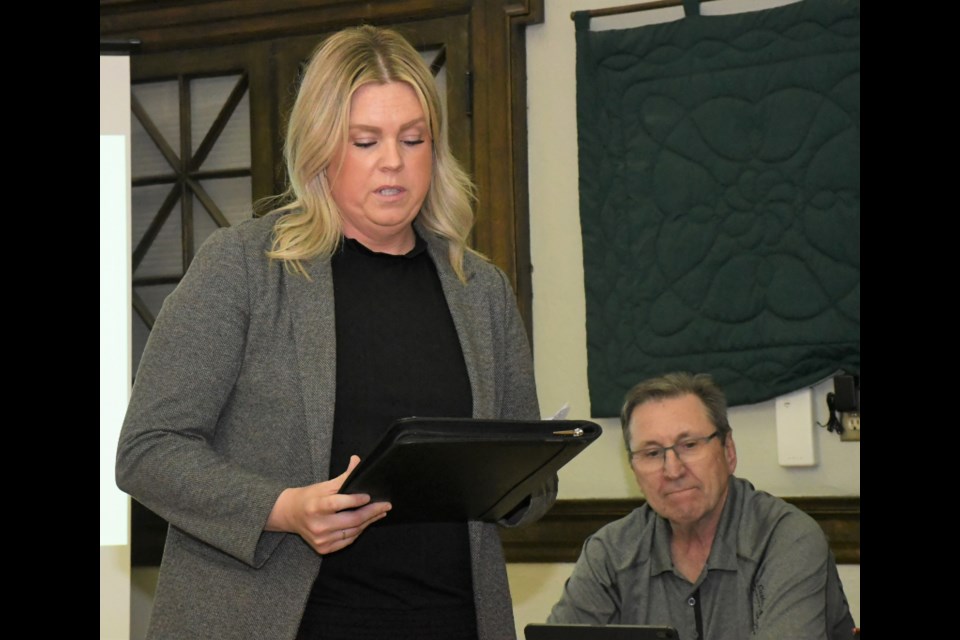A trauma dog, tactical specialists and mental health workers are some teams that work with the Moose Jaw Police Service and help bring peace and safety to the community’s streets.
The police service (MJPS) gave a presentation during the Board of Police Commissioners’ recent meeting about the units within the agency. Some sections include Victim Services, the tactical response team and the Police and Crisis Team (PACT).
Victim Services
Terri Roney, victim services co-ordinator, and her three-year-old partner Sven, a black Labrador retriever, are the main employees in the unit. A group of civilian volunteers also contributes to the team.
Last year Victim Services supported 788 individuals affected by crime, from sexual assaults to violent incidents.
Roney has been co-ordinator since September 2022, while Sven has been working since December. Both must pass their judicial field and public access tests yearly, while he requires regular training.
Roney explained that the pooch is a certified facilities dog that works with victims of crime — including children — and comforts them in court when necessary by putting his head or paw on their laps.
Further, he also supports those in crisis, helps those affected by sexual assaults or interpersonal violence, helps people who give forensic interviews or comforts residents after traumatic events.
Since his arrival six months ago, the trauma dog and Roney have deployed 46 times into the community to help residents affected by crime or tragedy, she added.
Tactical response team
With the drug trade and violent crime increasing over the years and police encountering more firearms, the organization decided in September 2020 to create a tactical response team to better respond to high-risk situations, Bourassa said.
So, he tasked Staff Sgt. Taylor Elder to create a team of highly trained and well-armed officers who could respond to serious situations instead of waiting for a SWAT team from Regina or the RCMP.
Elder explained that he and Const. Rod Zoerb were the unit’s first members, while they later selected six officers and trained them — at $15,000 per person — last year; the team is composed of seven men and one woman.
Using provincial funding, the MJPS acquired equipment in 2022 so the unit could bring tense situations to safe conclusions, he continued. Since unit members are also everyday officers, they train whenever they have time.
Elder has been with the MJPS since 2009 and has noticed more situations involving gun violence. He noted that there were two times last year when offenders shot at police; both times, he texted his wife to say he was OK.
Elder added that residents should always contact police when they see something suspicious, even if it means calling daily.
Police and Crisis Team
The Police and Crisis Team (PACT) has been operational since October 2018 and attends to scenes if someone is suffering from a mental health crisis, explained Const. Jay Sills.
PACT then connects people with mental health services, such as social services, methadone programs, Alcoholics Anonymous, shelter, or even transportation to the hospital. However, it attempts to divert people away from the hospital and to the proper support services.
The unit is composed of two teams of a police officer and mental health worker who sometimes act like crisis negotiators, he continued. He commended the Saskatchewan Health Authority’s Tanya Morland and Kirsten Clark for their knowledge and quick ability to access resources.
The unit has developed partnerships in the health community, including with psychologists who can provide immediate help, Sills said. Furthermore, PACT has built relationships with the community, considering it deals with 10 per cent of the population 90 per cent of the time.
Some relationship- and trust-building activities include visiting with clients, offering them a cigarette and coffee, or taking them for a meal.
“This has been — in my view — one of our most impactful units in regards to our day-to-day policing and how we handle someone in crisis,” he added.
The next police board meeting is Thursday, July 6, at the Cultural Centre.




